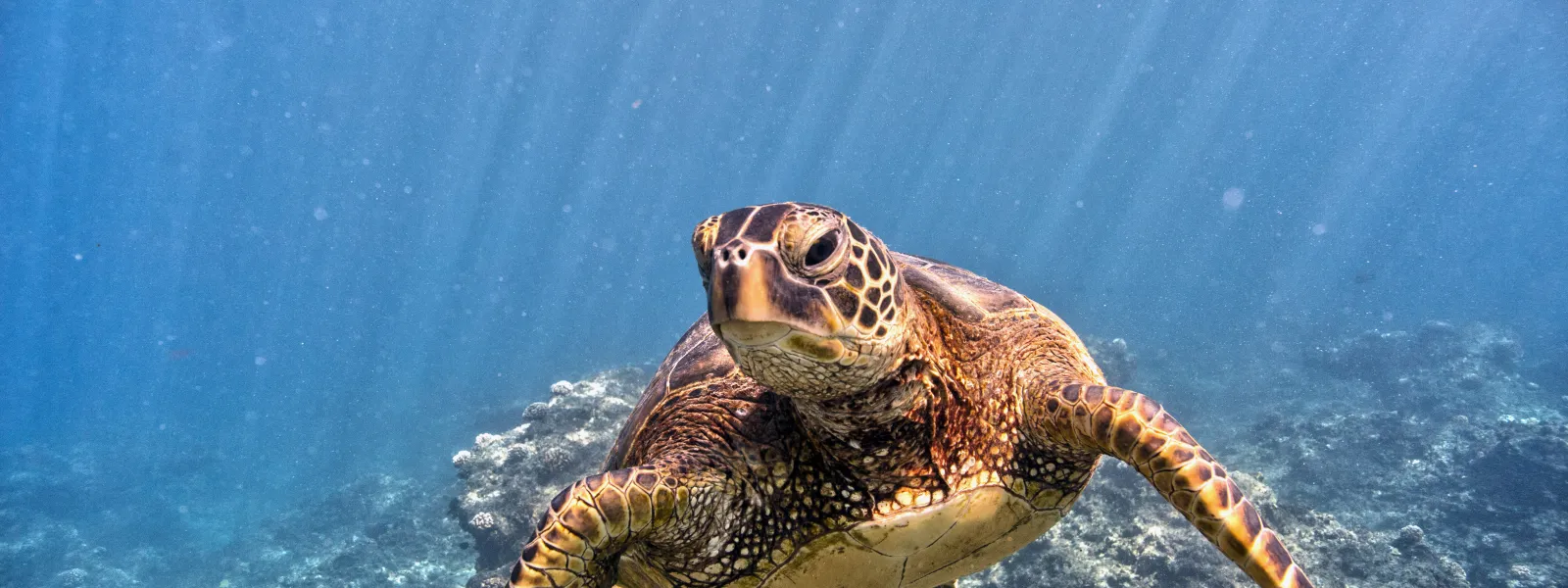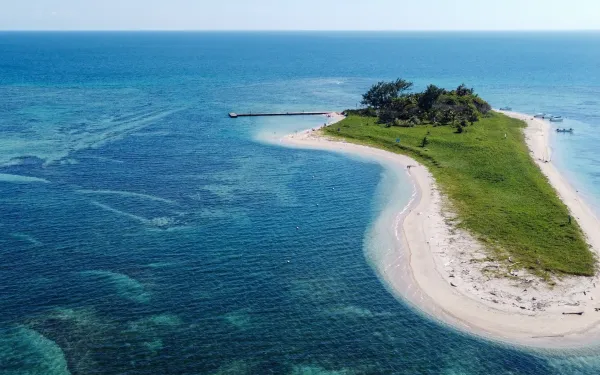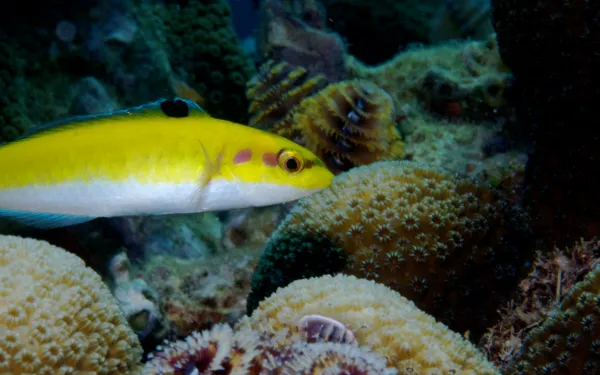
Project
Victory: Court ends the “lawful” killing of endangered green sea turtles
In February of 1999, the Constitutional Court in Costa Rica declared an end to the "lawful" killing of endangered green sea turtles. The ruling is an important victory for the green sea turtle and potentially other species left vulnerable by their host countries.
Costa Rica has the privilege and responsibility of being a haven for one of the largest remaining populations of this endangered species of marine turtle in the Atlantic Ocean. Every two or three years, female green sea turtles, many of which are decades old, slowly plod from their ocean homes to nest on a 35 kilometer long beach between the Tortuguero and Parismina River.
Costa Rica, rather than fully protecting these ancient guests, previously had a law allowing for the capture and slaughter of almost two thousand green sea turtles annually. Unfortunately, poachers exploited the law to kill many more than the legal limit, with the survival of the sea turtles jeopardized.
In response to inaction by the Costa Rican government, and to safeguard the survival of the green sea turtle, AIDA worked through its partner organization CEDARENA to file suit and challenge the law.
In the law suit, AIDA and CEDARENA argued that the law violated the Costa Rican constitutional guarantee of an environment that is healthy and “in ecological equilibrium.” We presented hard evidence of the hidden impact of the law on the sea turtles. The Court ruled in our favor, and annulled the law.
The ruling itself does not end the threat to green sea turtles. It may however, provide some breathing room for conservationists to concentrate on stopping illegal poaching. Hopefully, they will succeed.
Related projects

Reaffirming the legitimate protection of the right to a healthy environment
In December 2016, two women from Veracruz decided to defend the Veracruz Reef System in court. They sought to protect the largest coral ecosystem in the Gulf of Mexico from the expansion of the port of Veracruz, which would cause serious and irreversible impacts on the reef’s biodiversity and, by extension, the local population. Residents of the Veracruz metropolitan area, represented by the Centro Mexicano de Derecho Ambiental (CEMDA), filed an injunction against the project because its environmental permit resulted from a fragmented impact assessment that did not consider the full range of risks to the reefs. AIDA supported our partners at CEMDA by filing an amicus brief with detailed information on the important services the reefs provide: sequestering carbon, generating oxygen, producing food, and protecting coastal areas from storms and hurricanes, among others. In April 2017, the court that heard the case rejected the injunction and, with it, the request to suspend work on the port expansion. The court argued that the plaintiffs failed to demonstrate that the project had "a real and relevant impact" on their rights and that they lacked a "legitimate interest" in the case. Legitimate interest—also known as legal standing—refers to a person’s capacity to claim damages before a court of law, in any scope. In a traffic accident, for example, only you have the legitimate interest to claim the damages your vehicle may have suffered, which must be individual and quantifiable. However, in matters of environmental damage, the situation is more complex. The degradation of an ecosystem affects more than one person and even transcends generations. The residents of Veracruz appealed the judicial setback and their case arrived before Mexico’s highest court, the Supreme Court of Justice of the Nation. Given the lower court’s limitations in recognizing in its ruling the right of all people to equal access to justice in environmental matters, AIDA and Earthjustice filed a second legal brief before the Supreme Court, requesting an expansion of the requirements for legitimate interest. We provided legal and technical evidence regarding the human right to a healthy environment and access to justice, enshrined in international law. These rights mean that the Mexican government must ensure that anyone whose fundamental rights are threatened by environmental degradation has the possibility of achieving justice, regardless of whether their connection to the threatened ecosystem is indirect or remote. The Environmental Law Alliance Worldwide also contributed a brief that analyzes court decisions from various jurisdictions recognizing the right of any person, civil society organization, or local resident to file lawsuits against projects and decisions that may negatively affect the environment. Finally, on February 9, 2022, more than five years after the original lawsuit was filed, the residents of Veracruz won an important victory for the area’s reefs. In a unanimous decision, the Supreme Court found that government authorities violated the right to a healthy environment of the people of Veracruz by authorizing the port’s expansion. Since it was unopposed, the ruling creates a binding precedent for all courts of the nation. The Veracruz decision is a landmark ruling, valuable for not just Mexico but for the entire region because it: Ratifies that proximity to a project does not define who the affected people are or who can claim protection of their right to a healthy environment before the courts. Reaffirms that it is not necessary to prove quantifiable and individualized damage in order to have access to environmental justice; it is sufficient to demonstrate that a project or activity, by degrading an ecosystem, damages or threatens to cause damage (economic, social, cultural, health, etc.) to a community. Recognizes an expanded legitimate interest, as well as the collective nature of the right to a healthy environment and public participation in environmental assessment processes. Sets a precedent with the capacity to transform the way in which environmental impact assessments are carried out in Mexico, incorporating the principles of prevention and precaution. Points to Mexico's international obligations, including those acquired under the Regional Agreement on Access to Information, Public Participation and Access to Justice in Environmental Matters in Latin America and the Caribbean (Escazú Agreement). As an organization and individuals, we are celebrating this important step toward strengthening the defense of the right to a healthy environment in the region. We are proud to have contributed to this achievement, and hopeful that the implementation of the ruling will be carried out according to the highest standards.
Read more
Climate litigation in Latin America and the Caribbean: Launching a regional platform
By Maria Antonia Tigre, Florencia Ortúzar and Javier Dávalos* With the largest rainforest in the world, the largest freshwater reserves on the planet and the most significant amount of arable land where food is produced, the importance of Latin America and the Caribbean in the fight against climate change is undeniable. Unfortunately, however, the region is also highly vulnerable to the damaging effects of the climate crisis, despite not being significant emitters of greenhouse gasses. As a result, human and environmental rights are being threatened in a context where defenders are constantly at risk. Sadly, the region has been recognized as the most dangerous for environmental and human rights defenders. Strategic climate litigation has slowly grown in the region as a critical tool to complement the work for the defense of the environment, the territory, and the protection of the rights of peoples and communities. Litigating in the Global South and Latin America is different from litigating in the Global North, with particular challenges that must be addressed strategically. Cases in some of the most dangerous countries for environmental defenders might render them more vulnerable to attacks and threats. A lack of resources might leave plaintiffs, who bravely stand up for the cause, unprotected, and not only from violence but from subtler maladies, such as emotional stress or stigmatization. Another huge obstacle is the grave corruption that affects the region, which implies excessive power for extractive companies. Corruption is a widespread and deeply rooted phenomenon, especially in multimillion-dollar industries such as fossil fuels and extractivism. There’s a risk that companies or governments might co-opt academics, and proving and battling corruption is extremely difficult and dangerous. Finally, one of the most severe obstacles to making climate litigation effective in Latin America and the Caribbean is the difficulty litigators face when implementing favorable decisions. LAC presents some encouraging but at the same time alarming statistics around climate litigation. Although the vast majority of cases that have been resolved so far have had favorable decisions, the implementation of these has, so far, been unsatisfactory. There is much to be done on this front, including identifying administrative deficiencies of States that influence the difficulty of enforcing decisions; and considering, from the planning stage of cases, which remedies are sought and how implementation will be demanded. Despite these challenges, climate litigation is already showing the power it beholds in promoting change. In Peru, a group of young people sued the government for failing to formulate and execute a national policy and plan to curb deforestation in the Peruvian Amazon (Álvarez et al. v Peru). In Colombia, the Wayúu indigenous communities promoted an action to annul the environmental permit of a colossal coal mine (Mina Cerrejon). In Mexico, Greenpeace promoted an injunction to stop atmospheric pollution and improve air quality in the State of Mexico (Greenpeace v Secretaría de Medio Ambiente). In Argentina, the Organización de Ambientalistas Organizados demanded that the Ministry of Environment halts the approval of offshore exploration of fossil fuels for its impacts on whales and climate change (Organización de Ambientalistas Organizados v Ministry of Environment and Sustainable Development). In Ecuador, a group of nine girls questions the Ecuadorian State for authorizing oil companies to burn gas in the Ecuadorian Amazon (Caso Mecheros). In Chile, the NGO Defensoría Ambiental sued the government and all the companies operating in an emblematic sacrifice zone for the environmental damage caused after years of operations (Daño Ambiental en Ventanas). And these are only some examples. The Climate Litigation Platform for Latin America and the Caribbean has been created in this context. The Interamerican Association for Environmental Defense (AIDA), a regional NGO that uses the law to protect the environment and the human rights of communities, has been leading the effort in close collaboration with regional organizations and litigators who have been behind some of the cases in the region. AIDA launched the platform in a webinar, the recording of the event is available here. The Platform, which is maintained in Spanish, offers information on the judicial cases in the region that use climate arguments in a friendly and intuitive manner. It also includes a section of downloadable resources that might be useful for stakeholders who are planning on using the law to advance their cases. The goal is to promote more cases and better outcomes. Thus, the Platform is a tool to deliver, share strategies, experiences, and arguments on climate litigation, help create and strengthen alliances and facilitate contact between people who work in favor of the environment and climate. This initiative emanates from a collaboration with different organizations. It is a cross-cutting and participatory initiative that feeds on collective work. AIDA’s initiative fits well within the collaborative endeavors of the Sabin Center. In December 2021, the Sabin Center launched the Peer Review Network of Global Climate Litigation to enhance the field of study and practice in climate litigation and ensure broad and equal geographic representation in our Global Climate Litigation Database. The Network includes national rapporteurs who help us ensure the database is comprehensive and up-to-date. In addition, the Sabin Center is continuously partnering with regional initiatives that specifically analyze climate litigation within a national or regional context. As part of this ongoing effort, the Sabin Center has partnered with AIDA to share information and facilitate the exchange between collaborators of the two projects. The launch of this regional Climate Litigation Platform is not only great news for Latin America and the Caribbean but also for the whole active global community that uses the Courts in favor of the planet. Visit the Platform *Maria Antonia Tigre is Global Climate Litigation Fellow at the Sabin Center for Climate Change Law, Florencia Ortúzar is a senior attorney at AIDA and Javier Dávalos is coordinator of AIDA's Climate Program.
Read more
Supreme Court orders protection of Veracruz's reefs and wetlands
Mexico’s high court unanimously ruled that authorities violated the right to a healthy environment by authorizing the expansion of the Port of Veracruz. Environmental authorities failed to use the best scientific information, analyze the port expansion in a comprehensive manner, and consider all of its impacts. The ruling implies that the project’s approvals are unfounded and that its impacts must be re-evaluated, this time in a comprehensive manner, to determine the viability of the project. Mexico City, Mexico — On February 9, residents of Veracruz won a victory before the Supreme Court of Justice of the Nation in a legal injunction filed to defend the Veracruz Reef System (SAV) and its environmental services against the expansion of the Port of Veracruz. The justices of the Court unanimously voted in favor of the draft ruling that protects the reefs of Veracruz and transforms the way the Environmental Impact Assessment procedure operates throughout the country. This decision underpins the protection of the right to a healthy environment, and it sets a new precedent that will change the way officials determine how projects are assessed by their environmental impact. The Court held that "the protection of wetlands is a national and international priority that has led our country to issue a strict regulation of this ecosystem and… any analysis made in relation to wetlands must be guided by a criterion of maximum precaution and prevention." The ruling pointed out that the Secretariat of Environment and Natural Resources (Semarnat) violated the right to a healthy environment by authorizing the expansion project of the Port of Veracruz, since "it did not take into account the best scientific information available; it did not analyze or evaluate in a complete manner each one of the different environmental impacts that the project and its modification could cause, in addition to the fact that the project and the works related to it were analyzed in a fragmented manner." The Supreme Court’s ruling annuls the authorization for the port’s expansion and orders a complete reevaluation of the project’s environmental impacts and determination of the consequent viability of the project. "CEMDA filed this injunction, together with the community, to protect and contribute to the conservation of the Veracruz Reef System, as well as the reefs and the services they provide, since they are key to the well-being of the people living in the Veracruz-Boca del Río-Medellín conurbation," explained Xavier Martínez Esponda, CEMDA's Operational Director. The case sets a precedent that will transform the way in which Semarnat and state authorities conduct Environmental Impact Assessments in the country. Martinez Esponda pointed out that, "with this decision, the principles of prevention and precaution will have to become much more ingrained in the decision-making process. Likewise, authorities and investors should learn the lesson that it is more expensive, in all senses, not to present their projects in a complete manner, than to comply in time and form with the Environmental Impact Assessment." Background The Veracruz Reef System is a National Park and a wetland of international importance according to the Ramsar Convention. It has great environmental value as the largest reef system in the central region of the Gulf of Mexico. This reef system hosts the greatest biodiversity of species in the western Gulf of Mexico and is also home to several protected species, such as the critically endangered hawksbill turtle. The SAV also helps mitigate the impact of storm surges and hurricanes, which have increased in frequency and intensity as a result of climate change. The Port of Veracruz expansion project was proposed in the late 1990s and its implementation included plans for new breakwater works, access and navigation channels, land access, terminals, and port facilities. These works will damage reefs and seagrasses in the area, as they will be impacted by the increased sedimentation caused by the construction works. Due to the importance of the case, international environmental protection organizations supported the process. Earthjustice and the Interamerican Association for Environmental Defense (AIDA) delivered a joint amicus brief to the Supreme Court in support of CEMDA’s filing with the court. Sandra Moguel, AIDA's attorney, emphasized that "it is not the proximity of a project that determines who are the affected people and who should have access to justice to defend their right to a healthy environment." In its brief, AIDA explains that international law obliges the Mexican government to allow anyone whose fundamental rights are threatened by environmental harm to access judicial remedies, even if their connection to the threatened ecosystem is indirect or remote. Guillermo Zuñiga, an attorney with Earthjustice, emphasized that his ties to this reef are important and personal: "I grew up in Veracruz. I am a Xalapeño. That area gave birth to me, and I grew up swimming in the rivers and beaches of Veracruz with my family. I want the children of Veracruz to have the opportunity to enjoy the richness of its biodiversity as I did." Alejandra Serrano Pavón, a lawyer with the international organization Environmental Law Alliance Worldwide (ELAW), was interested in the case because of the opportunity to encourage the Court to broadly interpret the right to access to justice in defense of the environment. ELAW presented an amicus brief that supported the filing, through which is provided examples from various countries around the world that recognize a broad interpretation of this right, which allows "any civil society organization or, at least residents of a place, to initiate a legal action to protect the environment." We widely celebrate this decision of the First Chamber of the Supreme Court, and we hope that in the process of executing the judgment, the Secretariat of Environment and Natural Resources complies with what it has been ordered to do under the highest standard of protection enshrined in the Regional Agreement on Access to Information, Public Participation and Access to Justice in Environmental Matters in Latin America and the Caribbean, known as the Escazú Agreement. Underwritten by: AIDA Earthjustice ELAW CEMDA press contacts: Ricardo Ruiz, CEMDA, [email protected], 5559644162 Victor Quintanilla, AIDA, [email protected], 5570522107
Read more